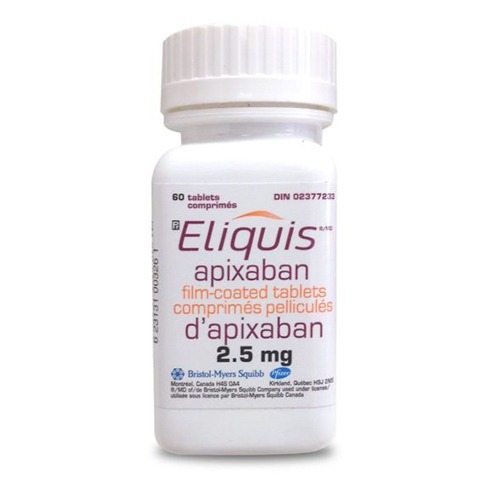Dosage of Eliquis
The recommended dosage is 2.5 mg or 5mg taken orally twice per day, with or without food. This dose may vary depending on the patient's medical condition and other factors such as age and weight. It is important to follow your doctor's instructions and not adjust the dosage without consulting them first. Talking additional tablets can increase the risk of experiencing
How Eliquis Works
Eliquis belongs to a class of medications called factor Xa inhibitors. It works by blocking the activity of a certain protein, Factor Xa, which is necessary for blood clotting. This helps prevent the formation of blood clots and reduces the risk of stroke or other serious complications.
Before Eliquis is Prescribed
Before prescribing Eliquis, your doctor will evaluate your medical history and any current medications you are taking. Inform your doctor if you have a history of bleeding problems, spinal punctures, or an artificial heart valve.
This medication may also not be suitable for patients with antiphospholipid syndrome (APS). Depending on your individual case, your doctor may also perform blood tests to determine the appropriate dosage for you.
Side Effects of Eliquis
Like any medication, Eliquis may cause side effects. The most common ones include bleeding, dizziness, and nausea. If you experience severe or prolonged bleeding, it is important to seek medical attention immediately.
Other serious side effects may include allergic reactions or liver problems. It is recommended to carefully read the medication guide provided by your pharmacist. Call your doctor if you have any concerns or questions.
Side effects may include:
- confusion
- redness of the eye
- constipation
- joint pain or swelling
- dizziness
- Blood in the eyes
- unusual tiredness or weakness
- bruising or purple areas on the skin
- headache
- bloody or black, tarry stools
- nosebleeds
- hives, itching, skin rash
- tightness in the chest
- severe stomach pain
- fainting
- coughing up blood
- blood in the urine
- decreased alertness
- vomiting of blood or material that looks like coffee grounds
- fast heartbeat
- nausea and vomiting
- shortness of breath
- puffiness or swelling of the eyelids or around the eyes, face, lips, or tongue
- difficulty swallowing
Precautions and Warnings
It is important to take precautions while taking Eliquis to ensure its effectiveness and avoid potential risks. This medication has a higher risk of bleeding, especially in patients over 75 years old or those with kidney problems.
To reduce this risk, it is recommended to avoid activities that may cause injury or bleeding. This includes contact sports or certain medications like aspirin or nonsteroidal anti-inflammatory drugs (NSAIDs). You may also be more likely to bleed excessively from cuts.
What is Eliquis Used For?
Eliquis is primarily used to reduce the risk of blood clots in patients with nonvalvular atrial fibrillation. It is also prescribed for patients who have had knee or hip replacement surgery to prevent deep vein thrombosis (DVT). This medication may also be used for other purposes as determined by your doctor.
Can I take Eliquis if I have an artificial heart valve?
Scientists are not completely sure if it is safe to take with an artificial heart. If noy, your doctor should b able to provide alternate treatment options.
Can Eliquis be mixed with water or apple juice?
No, it is important to take this medication whole and not mix it with any other liquids. Talk toy our doctor if they have difficulty swallowing the tabs whole.
What is the risk of bleeding while taking Eliquis?
The risk of bleeding may be increased if you are over 75 years old, have kidney problems, or take certain medications. Talk to your doctor about ways to reduce this risk.
Can I stop taking Eliquis if I experience side effects?
Consult your doctor before stopping or adjusting the dosage of any medication. Your risk of developing blood clots increases when your treatment stops. Your doctor may suggest alternative options based on your individual case.
